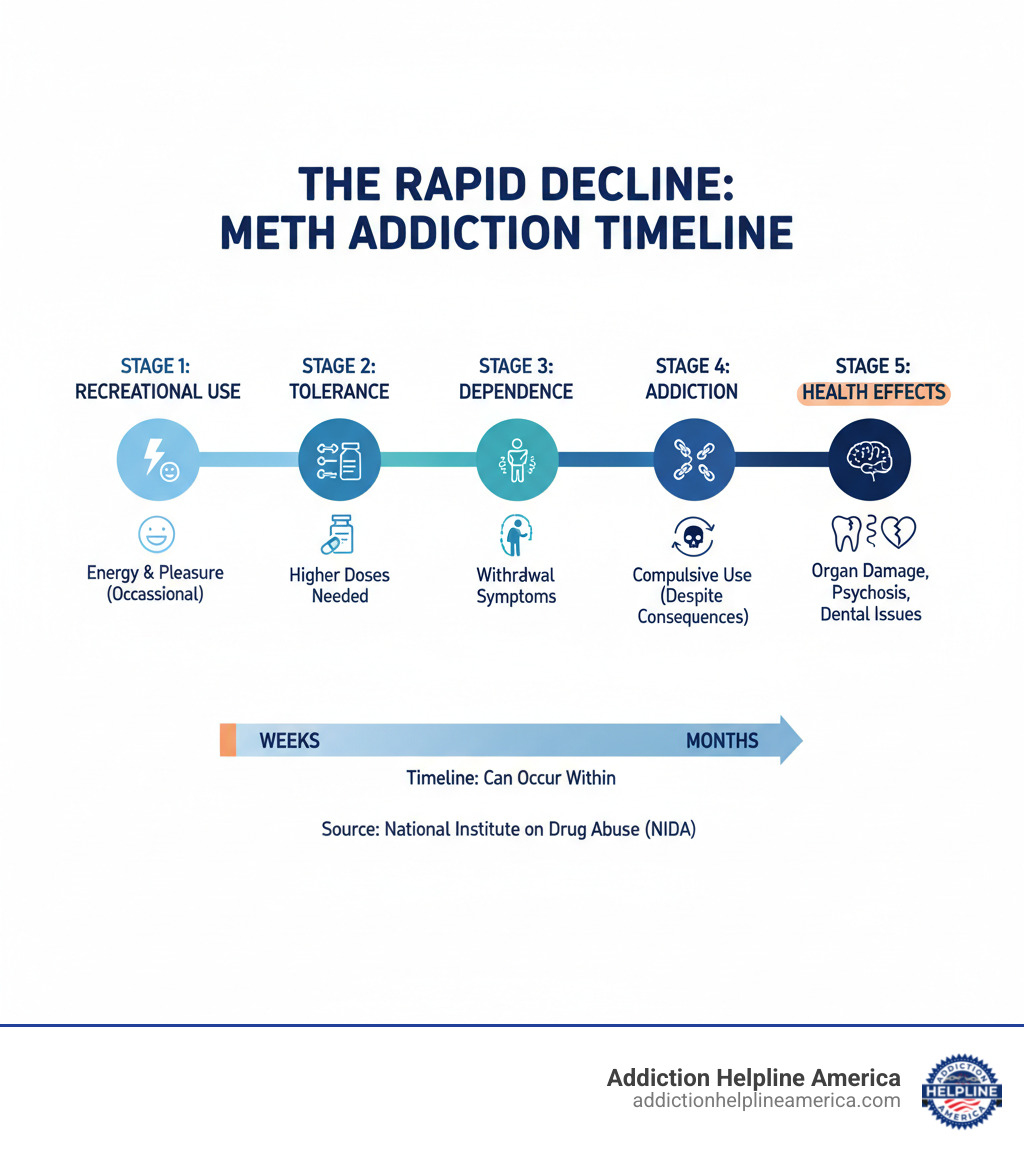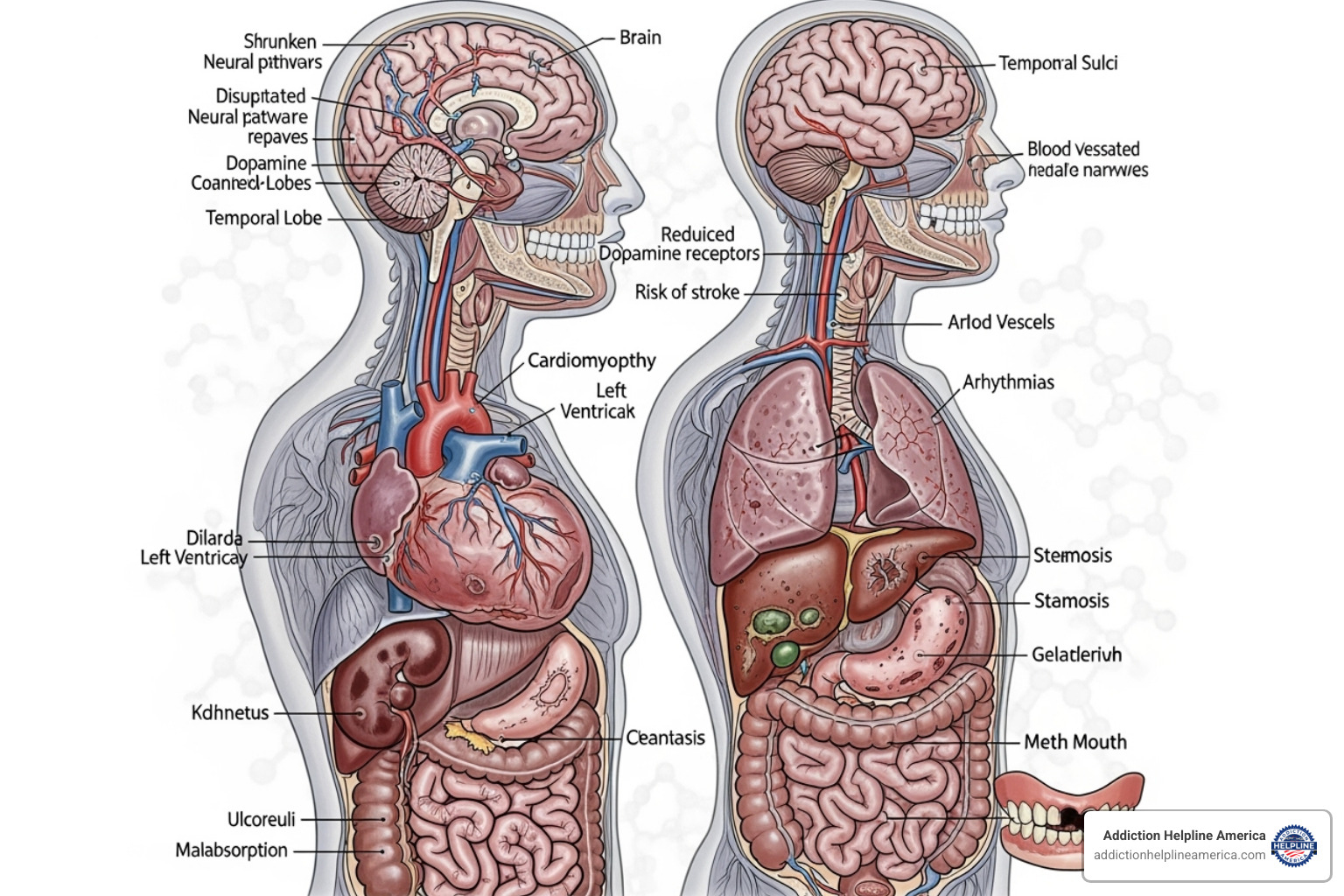
Understanding Methamphetamine Addiction and Finding Help in Costa Mesa
Meth rehab in costa mesa provides a lifeline for those struggling with methamphetamine addiction. Treatment options range from medical detox and inpatient care to flexible outpatient programs, with costs varying from $5,000 to $60,000 per month, often covered by insurance.
Methamphetamine addiction is a critical issue in Orange County, where substance abuse claims over 1,000 lives each year. However, recovery is possible. Costa Mesa provides numerous evidence-based treatment centers that address the specific challenges of meth addiction, including intense cravings and co-occurring mental health conditions.
Navigating treatment options during a crisis is daunting. At Addiction Helpline America, we simplify this process. We connect individuals and families with personalized meth rehab options in Costa Mesa that fit their needs and budget, helping you take the first step toward healing.
This guide will cover the signs of meth addiction, what to expect in treatment, payment options, and how to find a reputable facility to break free from methamphetamine’s hold.
Recognizing the Need for Help: Signs and Effects of Meth Addiction
Recognizing the need for help is the first step. Meth addiction can transform a loved one, but the signs are often clear if you know what to look for. People struggling with addiction may try to hide their use, but the physical, behavioral, and psychological changes are hard to miss.
Signs and Symptoms of Methamphetamine Use
Methamphetamine is a powerful stimulant that causes dramatic changes. Key signs include:
- Physical Signs: Rapid weight loss, dilated pupils, skin sores (from picking at “meth bugs”), severe dental decay (“meth mouth”), hyperactivity, and poor personal hygiene.
- Behavioral Changes: Increased secrecy, lying, erratic mood swings, social withdrawal from friends and family, unexplained financial problems, and neglecting responsibilities.
- Psychological Symptoms: Severe paranoia, hallucinations, intense anxiety, insomnia for days at a time, and deep depression or suicidal thoughts during withdrawal.
If you recognize these signs, it’s time to seek help. For more information, read about The Common Effects of Drug Addiction.
The Devastating Long-Term Effects of Meth
While the initial high of meth offers euphoria and energy, the long-term consequences are severe and can be irreversible. The drug rewires the brain’s reward system, leading to powerful dependence.
Long-term physical effects include debilitating dental problems (“meth mouth”), cardiovascular damage leading to heart attacks or strokes, and a high risk of infectious diseases like HIV and hepatitis from needle sharing. Malnutrition, extreme weight loss, and damage to the liver and kidneys are also common.
Mental health consequences are equally profound. Chronic use can lead to persistent anxiety, depression, and cognitive impairment affecting memory and decision-making. A severe condition known as meth-induced psychosis, which mimics schizophrenia with intense paranoia and hallucinations, can also develop. Co-occurring mental health disorders are common, making integrated treatment essential. You can learn more about this at Bipolar and Addiction.
Despite these devastating effects, recovery is absolutely possible. With the right support from a meth rehab in Costa Mesa, you or your loved one can heal.
The Path to Recovery: What to Expect from Meth Rehab in Costa Mesa
Deciding to seek help is a courageous first step. A meth rehab in Costa Mesa provides a structured, supportive environment for healing. Here’s what to expect on the path to recovery.
The Stages of Professional Meth Addiction Treatment
Recovery is a journey through distinct stages of care:
- Medical Detoxification: This first step, lasting 3-10 days, involves safely managing withdrawal symptoms like severe depression and paranoia under 24/7 medical supervision.
- Inpatient/Residential Treatment: Lasting 30-90 days, this immersive program removes you from triggers and provides intensive therapy and support. Longer stays are often recommended for meth addiction. Learn more about Treatment Options Inpatient Drug Rehab.
- Outpatient Programs (PHP & IOP): As you progress, you can transition to outpatient care. Partial Hospitalization Programs (PHP) offer structured daily treatment, while Intensive Outpatient Programs (IOP) provide more flexibility, allowing you to balance recovery with work or family.
- Sober Living Homes: These provide a supportive, drug-free environment to practice new life skills before returning to fully independent living.
Evidence-Based Therapies for Lasting Sobriety
Quality rehabs use scientifically proven therapies to address the root causes of addiction:
- Cognitive Behavioral Therapy (CBT): Helps you identify triggers and develop healthier coping mechanisms.
- Contingency Management: Uses positive reinforcement, like vouchers for clean drug tests, to help retrain the brain’s reward system.
- The Matrix Model: A comprehensive program designed for stimulant addiction that combines therapy, education, and relapse prevention.
- Dual Diagnosis Care: Treats both addiction and co-occurring mental health conditions like depression or anxiety simultaneously. This integrated approach is critical for success. Explore our Drug Rehab Dual Diagnosis Rehabs page for more info.
- Family Therapy: Heals relationships and teaches loved ones how to support recovery effectively. See our resources on Family Therapy in Addiction Recovery.
Addressing Unique Challenges in Meth Rehab
Meth recovery presents specific obstacles that specialized programs are equipped to handle:
- Intense Psychological Cravings: Behavioral therapies provide strategies to manage the powerful, persistent cravings for meth.
- Anhedonia: Treatment helps the brain heal from its inability to feel pleasure by introducing healthy, rewarding activities like exercise and art therapy.
- Protracted Withdrawal: Rehabs offer ongoing support for lingering symptoms like fatigue, depression, and mood swings that can last for months.
- Psychosis and Paranoia: Facilities provide a safe environment and clinical management for severe symptoms like hallucinations or delusions, which typically improve with abstinence and proper care.
Specialized care is available to help you overcome these challenges. Get Help For Drug Addiction to start your journey.
How to Find Affordable Meth Rehab in Costa Mesa
Cost is a major concern for many seeking treatment, but effective meth rehab in Costa Mesa is more accessible than you might think. There are options to fit various budgets.
Understanding the Costs of Treatment
Treatment costs vary based on several factors. The level of care is the biggest driver, with 24/7 residential programs costing more than outpatient options. Program duration and amenities also influence the price. While luxury facilities are available, excellent clinical care can be found in more modest settings. The focus should be on quality treatment, not just perks.
Payment Options and Financial Assistance
Don’t let cost be a barrier. Several payment options can make treatment affordable:
- Private Health Insurance: Most PPO and POS plans from carriers like Aetna, Cigna, and Blue Cross cover substance use treatment. We can verify your benefits confidentially. Learn more about Aetna Insurance Rehab Coverage.
- State-Funded Programs: California offers resources for individuals with limited financial means.
- Sliding Scale Fees: Many centers adjust costs based on your income.
- Financing and Scholarships: Third-party loans and non-profit grants can help cover expenses.
Vetting a Reputable Meth Rehab in Costa Mesa
Choosing the right facility is crucial. Look for these signs of a quality program:
- Accreditation and Licensing: Ensure the facility is licensed by the California Department of Health Care Services (DHCS) and accredited by The Joint Commission (JCAHO) or CARF. You can check for Joint Commission accreditation online.
- Staff Credentials: The clinical team should be licensed and experienced in treating meth addiction and co-occurring disorders.
- Evidence-Based Philosophy: The center should use proven therapies like CBT and the Matrix Model and offer a personalized, dual diagnosis approach.
- Aftercare Planning: A good program emphasizes long-term recovery and provides a robust plan for support after you leave.
We can help you steer these factors to find a trusted facility. For more context, see our Best California Addiction Treatment Guide.
Building a Foundation for Lifelong Recovery
Completing a rehab program is a major milestone, but recovery is a lifelong journey. The transition back to daily life requires ongoing commitment and support to maintain sobriety.
The Critical Role of Aftercare and Relapse Prevention
An aftercare plan is your safety net for long-term success. Key components include:
- Ongoing Therapy: Continuing with individual or group counseling helps you manage new stressors and reinforce coping skills.
- Support Groups: Groups like Narcotics Anonymous (NA) or SMART Recovery offer a free, supportive community of peers who understand the recovery journey.
- Sober Living Homes: These transitional residences provide a drug-free environment with peer accountability, bridging the gap between rehab and independent living.
- Relapse Prevention Plan: A personalized plan that identifies your triggers and outlines specific actions to take when cravings arise is an essential tool.
Staying connected to a recovery community, such as through alumni programs or aftercare services like Power Inside Reentry and Aftercare Baltimore MD, is crucial for navigating the challenges of sobriety.
How Families Can Provide Effective Support
Family support is a powerful asset in recovery, but it must be healthy and constructive for everyone involved.
- Educate Yourself: Understand that addiction is a brain disease, not a moral failing. This helps replace judgment with compassion. Resources like Life With An Addict can provide perspective.
- Set Healthy Boundaries: Boundaries protect your well-being and encourage your loved one to take responsibility for their recovery. This means refusing to enable destructive behavior.
- Participate in Family Therapy: Many programs offer family counseling to heal relationships, improve communication, and create a supportive home environment.
- Find Support for Yourself: You are not alone. Groups like Al-Anon and Nar-Anon offer support for families affected by addiction. Taking care of yourself is essential. Learn more at our Al-Anon page.
At Addiction Helpline America, we support the entire family through the recovery process.
Frequently Asked Questions about Meth Rehab
Here are answers to common questions about meth rehab in Costa Mesa.
How long does meth rehab usually last?
Treatment duration is personalized but generally follows a continuum of care. It often begins with a 5-10 day medical detox, followed by a 30- to 90-day inpatient program. For meth addiction, longer stays (60-90 days) are often more effective. Afterward, outpatient programs and sober living can provide support for several months to a year, gradually stepping down the level of care as you build a strong foundation in recovery.
Can meth addiction be treated with medication?
Currently, there are no FDA-approved medications specifically for treating meth addiction. However, medication is a vital part of recovery. It is used to manage withdrawal symptoms during detox and, more importantly, to treat co-occurring mental health disorders like depression or anxiety. Addressing these underlying conditions is often key to preventing relapse. The primary treatment for meth addiction remains behavioral therapies like CBT and the Matrix Model.
What is the success rate for meth rehab programs?
While there’s no single success rate, the National Institute on Drug Abuse (NIDA) confirms that treatment is effective. Success is significantly improved by several factors: longer treatment duration, comprehensive dual diagnosis care for mental health issues, the use of evidence-based therapies, and a strong aftercare plan. Relapse can be part of the process, but it doesn’t mean failure. It’s an opportunity to re-engage with support and strengthen your recovery plan. With commitment and the right program, long-term recovery is achievable.
Conclusion
The path out of methamphetamine addiction is challenging, but recovery is a reality. Meth rehab in Costa Mesa offers a structured, evidence-based approach to healing, from medical detox to comprehensive aftercare.
Effective treatment addresses the unique aspects of meth addiction, including intense cravings and co-occurring mental health conditions, using therapies like CBT and the Matrix Model. We’ve shown that affordable options are available through insurance, sliding scale fees, and other financial aid, making quality care accessible.
Recovery is a lifelong journey supported by ongoing therapy, support groups, and a strong family system. You do not have to do this alone.
At Addiction Helpline America, we are here to connect you with a meth rehab in Costa Mesa that fits your needs and budget. Take the first step toward a life free from methamphetamine.
Find personalized guidance for meth rehab in Costa Mesa and let us help you start your recovery journey today.
Our helpline is 100%
free & confidential
If you or someone you care about is struggling with drug or alcohol addiction, we can help you explore your recovery options. Don’t face this challenge alone—seek support from us.
Programs
Resources
Will my insurance
cover addiction
treatment?
We're ready to help
Find the best
drug or alcohol treatment
center
Are you or a loved one struggling with addiction? Call today to speak to a treatment expert.

















